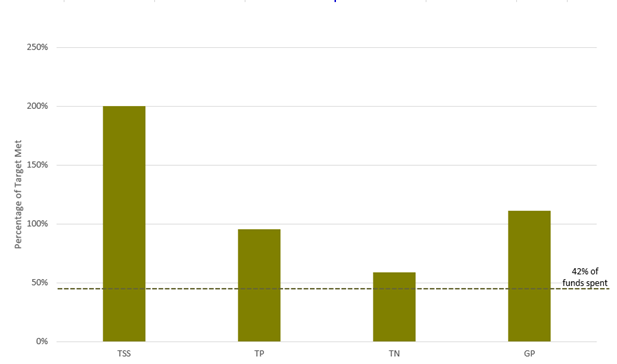This council Program uses fees paid by developers to deliver water quality improvement projects in Ipswich. Projects delivered by council include stabilising creeks, naturalising channels, re-engaging floodplains and constructing wetlands and bioretention basins. To ensure the best outcomes, these projects must include water quality improvements as well as other environmental and social benefits.
How does it work?
The Off-site Stormwater Quality Improvement Program is a voluntary program for developers. A developer interested in participating can apply to council to have its water quality treatment responsibilities offset. If approved, the developer makes the required fee payment to council and those funds are used by council to deliver a water quality improvement project at another location (not within the development area). Not all development is eligible to participate. For example, council does not allow offsetting where development is within sensitive receiving areas or for greenfield development.
- Off-site Stormwater Quality Improvement Guidelines (PDF, 2.6 MB)
- Off-site Stormwater Quality Improvement Policy (PDF, 297.0 KB)
Why have an offsetting program?
The Off-site Stormwater Quality Improvement Program creates both on-ground improvements and long-term sustainability of constructed stormwater quality assets.
- Reduces potential for poorly designed and/or constructed stormwater quality assets within developments
- Reduces costs to ratepayers of rectification and/or maintenance of these assets once they are transferred to council ownership
- Reduces the number of small privately-owned on-site stormwater quality assets which may be susceptible to future neglect or removal
- Allows council to select strategic locations, across the local government area, for projects that will provide greater water quality and other benefits
- Allows council to deliver the type of project, suited to a specific location, that will provide greater co-benefits (such as flood mitigation and habitat creation).
Program achievements
Council has completed a diverse range of projects through the Off-site Stormwater Quality Improvement Program (previously called the Stormwater Quality Offset Program). There are clear overall water quality improvements delivered by council’s off-site projects.
As of 30 June 2023, council had used 42 per cent of the funds received but had achieved between 59 per cent and 200 per cent of its water quality improvement responsibilities (see graph below).
Those offsite projects completed so far prevent more than 917 tonnes of sediment and 1.3 tonnes of nitrogen from entering Ipswich’s waterways each year.

Graph: Progress toward meeting council's water quality offset responsibilities
- TSS: Total Suspended Solids
- TP: Total Phosphorous
- TN: Total Nitrogen
- GP: Gross Pollutants
Council seeks projects for the Program that provide multiple outcomes.
This includes:
- Water quality improvements
- Infrastructure and property protection
- Flood mitigation
- Increased biodiversity
- Habitat improvement
- Carbon capture
- Urban cooling
- Improved air quality
Annual reporting
Council is committed to evaluating and reporting on the Off-site Stormwater Quality Improvement Program. This reporting ensures transparency and conforms to State Government guidance. Program evaluation and reporting also assists with continued improvement. This allows council to adapt the program to ensure full benefits can continue to be achieved.
- Stormwater Quality Offsets annual report 2022-2023 (PDF, 7.5 MB)
- Stormwater Quality Offsets annual report 2021-2022 (PDF, 7.9 MB)
Changes to the Program
In late 2022, council undertook a review of the Program to ensure it can meet the responsibilities it inherits from developers participating in the Program in the future. The review has driven several changes to the Program which are summarised in the fact sheet below.
Example projects
Franklin Vale Creek Initiative
Council has worked with landholders to restore Franklin Vale Creek, on Ipswich’s western boundary.
The instability and bank erosion of this creek impacts water quality entering the Bremer River, the biodiversity values of this wildlife corridor and the productivity of graziers.
Actions include revegetation, offline watering points and stock exclusion fencing.
Find more information on the Franklin Vale Creek webpage.
Small Creek naturalisation
Council has transformed a straight concrete channel in Raceview to a living, naturalised creek.
As well as stormwater pollutant reduction, improved habitat and visual amenity, Small Creek offers path and bikeway connections for the community.
Three stages of this award-winning project are completed, between Warwick Road and Poplar Street Park.
For more information, see the Small Creek webpage.
Water Smart Street Trees
This is an innovative way of diverting stormwater from the kerb to nourish street trees.
The trees capture nutrients and sediments that would otherwise wash into our rivers and creeks.
These sustainable, self-watering street trees are designed to fit neatly into the streetscape and landscape, adding to neighbourhood appeal.
For more information, see the Water Smart Street Trees webpage.
Jim Donald Wetlands
These constructed wetlands in Eastern Heights are an excellent example of multiple benefits from one project.
Stormwater flows into a pond which captures most of the dirt and particles.
The filtered water is harvested for use on the sport fields.
The lush native vegetation provides habitat for species such as frogs and birds, as well as visual amenity.
Ironpot Creek stabilisation
It has a history of being one of Ipswich’s most damaged creeks, with dispersive soils causing severe bank erosion, scouring and sediment.
Since 2019 Council has undertaken works to stabilise sections of Ironpot Creek.
Thousands of native plants and tonnes of rock have been installed.
Early stages have already proved successful at protecting the creek during flood events.